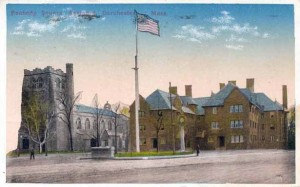The Dorchester Historical Society celebrates four centuries of Dorchester life through its collections and programs. Dorchester was first settled by immigrants from the West Country of England in 1630. Their ship, the Mary and John, left Plymouth on March 20th and arrived off Nantasket in late May or early June. These hardy families made their way north along the shore in search of a suitable place to live and made their homes in Dorchester-the first settlement in the area, preceding even Boston. Ever since, new immigrants have found their way to Dorchester to become part of its history whether they have come from other parts of Boston or from foreign countries. The Dorchester Historical Society honors everyone’s story.
The Society has a substantial volunteer infrastructure that maintains its activities and has done so for over a hundred years. It presents regular monthly programs and publishes monographs relating to Dorchester history. The Society owns and cares for three historic houses dating from 1661, 1765 and 1806. The Society has collections of written and printed materials relating to Dorchester history as well as collections of artwork and other objects that relate to Dorchester.
The purpose of the Dorchester Historical Society, founded in 1843 and incorporated in 1891, is to collect, preserve, and disseminate knowledge of the history of that section of the City of Boston which was formerly the Town of Dorchester; to hold, and aid in the preservation of, historic buildings and sites in the area; to care for, and from time to time, exhibit such articles of historic or antiquarian interest as may come into its possession.
For many years the Society has been actively interested in preserving the traditions and records of Dorchester and its people, from the earliest settlement in 1630 to the present time. The Society maintains three properties: the seventeenth-century Blake House, the eighteenth-century Captain Lemuel Clap House, and the early-nineteenth-century William Clapp House, which is also its headquarters.
Each year regular meetings of the members are held with programs of historical interest, including the Annual Meeting in May. New members and guests are always welcome. To support this voluntary work you are cordially invited to become a member of the Dorchester Historical Society. For more information, send email to our president, Earl Taylor.
In addition, the Society has generally been looked upon as the natural custodian and repository of material pertaining to Dorchester’s past. Documents, records, pictures or other memorabilia relating to Dorchester which you may wish to entrust to its care are always appreciated. They will significantly benefit succeeding generations through a more accurate knowledge and better understanding of the lives and times of their predecessors – which is what any history is really all about.
For additional information about Dorchester’s history – its people, its architecture, its businesses, its institutions – visit The Dorchester Atheneum.
If one of your ancestors ever lived in Dorchester from 1630 to yesterday, join the Dorchester Descendants project.
Founded: 1843
History of the Dorchester Historical Society: On January 27, 1843, concerned Dorchester residents met at the Deacon Ebenezer Clapp House on Sumner Street, and founded what was to be known as the "Dorchester Historical and Antiquarian Society." The success of the Society was insured through the incorporation by the General Court of Massachusetts in 1855. The primary activity of the organization concerned lectures on local history, but of lasting importance was the accomplishment of a vast amount of primary publishing. The Society published the following: Memoirs of Roger Clapp(1844), James Blake's Annals (1846), Richard Mother's Journal, and as a major capstone, The History of Dorchester (1859). However following the Civil War, interest in the Society declined. The group disbanded in the late 1880's with its substantial collections being deposited by William Blake Trask in the care of the New England Historical and Genealogical Society, and the Massachusetts Historical Society.
In 1891, with a reawakened interest in local affairs by many of the old families, in conjunction with new "streetcar suburb" residents, the Society was reorganized. The innovative ways of the Society were evident in a By-Law proposal that "women should be admitted upon equal terms with men," a move which not only lent a liberal and humanistic aspect toward historic preservation, but doubled the organization's membership.
In 1893, the Society was again chartered, with a membership dedicated to promoting, collecting and publishing the history of Dorchester, not only as a town, but as a part of Boston. Dorchester had progressively taken on the aspects of a "streetcar suburb" culminating with its annexation to the city of Boston on January 3, 1870.
Without official headquarters since 1843, the Society was offered the James Blake House by the City of Boston in 1895. This structure stood on property which had recently been acquired by the City of Boston for eventual use as a vast greenhouse complex. The Society, assisted by the Blake family, raised $1,000 to match the donation of the City of Boston, to move the Blake House to Richardson Park, just east of Edward Everett Square.
The relocation of the house marked one of the first preservation efforts in America on the basis of architectural merit of the house, rather than simply for its historical association. The structure, though not at the time of its moving, is now the oldest in Boston and more importantly the only representative example of West country framing in America. After the house was moved, the Society began its restoration under the direction of the noted architect Charles Hodgdon. Hodgdon restored the Blake House employing concepts architects of the late nineteenth century held as to how a seventeenth century house would have appeared. Though not an absolutely precise historic or architecturally accurate restoration, the house continues to be a widespread source of interest, generating community pride in the early merits and customs of Dorchester.
In 1904, the Society incorporated "Dorchester Day" which commemorated the settlement of Dorchester in 1630. An annual event, Dorchester Day is a tableau of community events, highlighted by such activities as the Landing Day Observance, the great Dorchester Day Parade, and as a grand finale, the Community Banquet.
After many years of meeting in the Blake House, and later in the Dorchester Court House which provided additional meeting and exhibit space, the Society was in need of a larger house or building in which to exhibit the vast Dorchester collections.
In 1945, the Society acquired the William Clapp House, the home of a member Frank L. Clapp, great-grandson of William Clapp. Built in 1806, the house is a fine example of a country neoclassical mansion. Mr. Clapp remained in the house as a caretaker of the forty odd acre estate until his death in 1953. The purchase of the Clapp Estate, comprised of the mansion, the Lemuel Clap House (c. 1710, 1765), a carriage house and two barns (one now demolished) was made possible through the generous trust fund of the late Emma M.E. Reed, wife of the late Judge George M. Reed of the Dorchester District Court. Since acquiring the two Clapp Houses, the Society's efforts to catalog and interpret Dorchester history and architecture have been greatly facilitated through substantial collections in the Robinson-Lehane Library.
Today the Society draws members from every section of Dorchester and beyond, forming a group dedicated to preserving the town's history and insuring that, for future generations, that sense and awareness of the past will be secure. Through the many years of its existence the Dorchester Historical Society has remained committed to these ideals and encourages and welcomes your interest and participation.
Collection overview: The Dorchester Historical Society has a large library of books, manuscripts, photographs, maps and drawings. However the Society has no staff to supervise the use of the library, so research inquiries must be submitted to the Society whose volunteers will attempt to find an answer. Dedicated volunteers are working at cataloging the collection, and they welcome new people to help. But you can check out the categories at the left of the screen to explore online and other resources for research into Dorchester history.
Become a member: To join the Society by postal mail, please send your name, address, telephone number, email address (if applicable), membership category, and a check for your dues (see chart below) to Barbara Langis, Membership Secretary, Dorchester Historical Society, 195 Boston Street, Dorchester, MA 02125. Please indicate whether this is a new membership or renewal, and whether you may be interested in volunteering.
Donate online: Why you should give to the Dorchester Historical Society:
The Society collects, preserves and shares Dorchester history, and it assumes the responsibility of caring for items so that they are intact for future generations.
Responsibility to Preserve Dorchester History
Although the Society has never had a budget for acquisitions, Dorchester stakeholders have recognized the value in having the Society act as the repository of buildings, archives, maps, books, photographs, paintings, textiles, pewter, pottery and other items related to Dorchester history. The Society has acquired extraordinary collections through donations over its long existence. Both the donors and those who benefit from the Society’s collections expect the Society to preserve and share the items it has received.
Properties
The Society owns five historic buildings at two different locations that help illustrate Dorchester history from the 17th century to the present, and it needs help to maintain them. The Society has completed a facilities-planning project supported by a grant from the Massachusetts Cultural Facilities Fund to determine priorities for the preservation of the buildings and landscape.
Dorchester Historical Society
195 Boston Street
Dorchester, Mass. 02125


Leave a Reply
You must be logged in to post a comment.